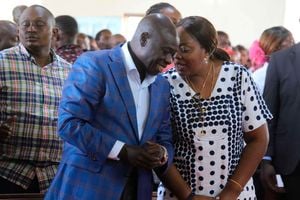Nativity: A child is born and the word becomes a ChatGPT digit

Christmas tree mounted at the Imaara Shopping Mall in Nairobi City.
Christmas is here once again and the magic, the madness, the merchandise and the manenos around the date of December 25 are enveloping us. I am largely neutral in all these matters. This, however, does not mean that I am indifferent to Christmas.
About the magic, for example, I am touched and moved when I walk around the glittering malls and arcades, all aflame with the colours of myriads of decorative lights.
I gaze wide-eyed, as I have always done, at the tall Christmas trees, some natural, some artificial, with bales of cotton wool wisps, to represent the snow.
I listen spellbound, sometimes, to the carols, either crooned by massed choirs, piped from various speakers or tapped out on portable musical keyboards outside shopping centres.
All this reminds me of not only my own childhood but also of the nearly two decades I enjoyed bringing up my children. But beneath all the glare, glamour and clamour, a few questions and doubts keep nagging me. Where, for example, is the African (the “me”) in all this?
But even more problematic for me is the exaggerated gaudiness of the decorations and, especially, the ear-splitting noisiness of the sound effects.
You cannot convincingly sell me “Silent Night” at 1000 decibels. A decibel is a measurement unit of loudness, as perceived by the human ear, and levels of loudness above 70 decibels can damage one’s hearing, and 120 decibels can cause immediate harm, according to experts.
I suspect that the Christmas hullabaloo and pandemonium, and the rest of its madness, including the eating and drinking binges, the suicidal and murderous driving on nearly all of our roads, and the irrational hiking of fares and prices on practically everything, are all symptoms of the abomination of merchandising Christmas.
Granted that the festival is a celebration that requires some resources, one still wonders whether all the extremes of spending to which parents, children, spouses, lovers and others are pushed during this season are justifiable.
But that is just where the trouble lies. Fewer and fewer people today seem to remember or even realise that Christmas is a religious or spiritual observation.
We seem to think that Christmas is about new “bling” clothes, fancy toys, frantic travel to expensive resorts or “home square” and eating, boozing and suchlike orgies.
This is what is called “taking the Christ out of Christmas”, “x-masising” it and demoting it to a carnival of self-indulging levity.
Yet the initiators of the festival intended it to be a commemoration of a key event in the chronology of their faith, as recorded in their scriptures. This is the birth, not literally on December 25, of the Founder of their church. But even at the barely human level, the birth of a child (“Nativity”, another name for Christmas, means “childbirth”) is a significant event.
It promises, in evolutionary terms, the preservation of the race or species. “Mary’s boy child was born,” as the Caribbean carol has it, “and man (humanity) will live for evermore because of Christmas Day.” But, as I might have mentioned to you before, the Christmas birthday has a special relevance for me and my comrades in the battlefield of language and literature.
It begins with my favourite verse from scripture, from the New Testament.
“The Word was made flesh,” runs the text from John’s Gospel, “and dwelt among us.” You will probably be hearing it several times during this season.
The verse suggests, with awesome economy, the mystic union of the divine and the human in what Christians call the “Incarnation”.
But for us ordinary devotees of the literal (and literary) word, the verse has another level of interpretation. It points to the power of the word, whether spoken, written, printed or digitalised, to create, change or erase reality.
We are called creative writers because, with our words, we bring up whole worlds of characters, sceneries, settings and events that never existed before we “worded” them.
Was there ever an Okonkwo of Umuofia before Achebe gave birth to him, through the word? What about Imbuga’s Boss and Tumbo of Betrayal in the City, or Akoko of Margaret Ogola’s The River and the Source?
Our words make and unmake. So, we must exercise them with care and caution, as must all those others who take it upon themselves, or feel called, to serve the word.
This Christmas, however, I think and speak of the word with a new reverence resulting from my awareness of very significant new developments in what my favourite writer, Walter Ong, called the “technologizing of the word”.
The late Ong traces the journey of the word from speech (orality) through writing (literacy) to printing (what he called the “Gutenberg Galaxy”). He was aware, before he passed on, of what he called “secondary orality”, as in the recorded and broadcast word.
In a quick jump to the present, we find ourselves in the world of the digital word, and world, where all the previous manifestations of the word merge.
Last weekend, for example, CHAUKIDU, the largest association of Kiswahili scholars, practitioners and enthusiasts, assembled in Arusha, to discuss the latest developments in our language. A great deal of the time at the international conference was devoted to considering AI (artificial intelligence) and its implications for the learning and spreading of Kiswahili today.
This was as it should be, because Generative Artificial Intelligence (“Akili Unde”, as the Waswahili called it, in a plethora of other Kiswahili istilahi) is arguably the most significant development in human civilization this century.
For us language practitioners, our challenge is to make such AI-driven applications as automatic translation and ChatGPT not only user-friendly but also “empathetic” and benevolent. Otherwise, the day the AI-empowered word rebels against us may not be very far off.
I wish you a blessed season. Joyeux Noel. Feliz Navidad.
- Prof Bukenya is a leading East African scholar of English and [email protected]





